By Angela Stringfellow on Jun 27, 2019 10:04:54 AM

At some point, nearly every family must together decide on and designate care plans for their elderly or infirm relatives. Although it’s a reality that is an emotional one to consider, much less delve into, pre-planning and abundant communication is the best way to broach the topic and keep a healthy conversation going well into the future. If you are currently about to step into a family caregiver role, or you are already in one, chances are, the prospect of caring for someone who once cared for you is a daunting one. You are entering a world of critical decisions, home healthcare, and possible financial burden that may fall squarely on your shoulders.
Fortunately, family caregiving is far from being an uncommon practice; as a matter of fact, according to the National Alliance for Caregiving, 29% of the American population provides care for a loved one, amounting to an average of 20 hours per week. It’s a staggering statistic, and one that reveals that you are far from being alone in this. In fact, 80% of Americans view caregiving as “the new normal.” All over the Internet, experienced family caregivers and professional resources alike have published thousands upon thousands of caregiving blogs and articles for all kinds of caregivers. In this piece, we have compiled 50 of the top tips that seasoned caregivers wish that they had known going into the role.
Self-Care Advice for Caregivers
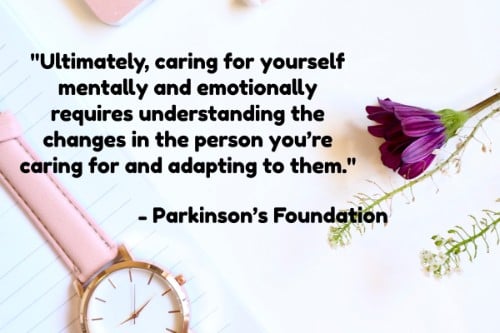
- Become sensitive to your loved one’s changing emotional needs. “Ultimately, caring for yourself mentally and emotionally requires understanding the changes in the person you’re caring for and adapting to them. The relative or friend you’ve always admired for his strength might be showing weakness; on the other hand, his perseverance and optimism in the face of debilitating illness might demonstrate strength you never knew he had. Your emotions throughout the journey will be varied, and some might surprise you.” – What to Expect Emotionally, Parkinson’s Foundation; Twitter: @parkinsondotorg
- If possible, focus on communicating and making choices with the loved one before anyone else. “Talking to your loved one can reveal many solutions that you might not have considered. Keeping communication open will also make your loved one feel good about coming to you for help.” – What Questions Should New Caregivers Ask?, GetCareSC
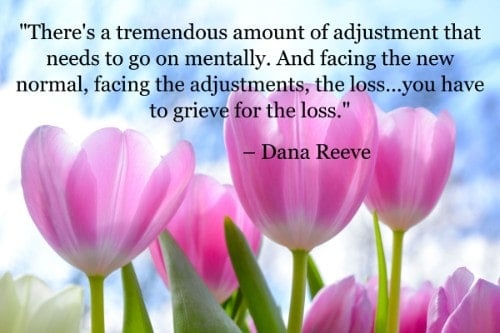
- Give yourself the time you need to adjust to your “new normal.” “After Chris was injured, we sort of operated as if it was like landing on another planet. It can look very bleak and overwhelming. There’s a tremendous amount of adjustment that needs to go on mentally. And facing the new normal, facing the adjustments, the loss…you have to grieve for the loss. Because it’s true – the only way for grief to be alleviated is to grieve. You need to acknowledge the loss. But at the same time, once you do that, you’re opening up a whole new area where you can have tremendous hope.” – Dana Reeve, Your Role as a Caregiver, Christopher & Dana Reeve Foundation; Twitter: @reevefoundation
- Own the choice that you made and the responsibility you took on. “A caregiver-spouse has to say at some point, ‘I freely choose this,’ in the same way as before the injury happened. And, if you don’t freely choose this with your whole heart, I don’t see how you can make it, because there’s going to be some part of you that is always mad, that always somehow resents this other person for what they’ve taken away from you.
“Being a family caregiver is relentless. You can never, ever really get away from it. It really helps to have a sense of humor; but, I think the most important thing isn’t really how you communicate. It’s the very basic choice and knowing that no one’s making you do anything. If you can accept this, you’ll find ways to work it out, whatever it is.” – Kate Willette, Some Things Are Unbreakable

- Take advantage of your quiet times and schedule time for self-care. “It’s in those rare quiet times that you have to prepare for the next day and week, that you need to make your to-do list, the doctors list, contact list, shopping list and what-friend-can-I-call-today list. Caregivers have little to no ‘self’ time, and when it came to planning my life’s future, that ceased. I didn’t want to think of future things, because I was unsure of what that would be for me. I had to learn (with the help of my therapist) that at some point I had to be selfish with my time.
“You need to think about something that you want to do and try to find a way to do it. Whether it’s getting your hair done, going for a manicure or going for a walk, see if you can put something in place that will give you free time. Look into a daycare facility, respite or a good friend who could give you that free moment.” – Pamela Rivers, Strap in for the Ride, Vitas; Twitter: @VITAS
- Maintain a strict health-care regimen of your own. “The number one thing that no one explains to you is how you must take care of yourself while you take care of others. Radical self-care is a necessity, not a luxury. You must maintain a healthy diet, get enough rest and ask for help. You need to get exercise and all the support you need. You can embrace your journey only if you are in top shape emotionally and physically. It’s challenging but doable if you are as kind to yourself as you are to others.” – Susanne White, 5 Things They Don’t Tell You Before You Start Your Caregiving Journey, Sixty + Me; Twitter: @sixtyandme

- Hone your time management skills. “Time management is all about prioritizing and accepting that you just won’t be able to do everything. This is especially important if you’re caring for someone while in other employment. Some things just have to be sacrificed and it helps to group your tasks according to urgency.
“Label your tasks as ‘Urgent – can’t wait,’ ‘Important – can wait,’ ‘Nice to have,’ and so on. This will help you to see what needs doing right away, and if there is more than one priority you have to consider getting someone else to do it. Planning properly can give you more confidence when asking other family members for their contribution. Sometimes, it’s learning to distinguish between needs and wants to relieve some of the pressure on you. A need is much more important than a want. Your mother may want you to reorganize her kitchen, but if she needs you to collect her medication that matters far more!” — Being a Family Caregiver: Practical and Emotional Tips, SuperCarers; Twitter: @SuperCarers
- Be upfront with all others in your life about your caregiving position. “The reluctance to tell others about this life-changing, high stress event is particularly prevalent among men. It’s a sad commentary on our culture that we still haven’t found a way to make men feel comfortable sharing with others that, when they’re at home, they’re taking care of a partner, a sibling, a parent, or a grown child. No wonder that men who are caregivers have such a high incidence of clinical depression.
“It’s not healthy for you to try and ‘go it alone.’ Even one friend in whom you feel comfortable confiding can make a big difference: one person to talk to about how hard this new and unexpected role is for you. The odds are high that this friend is waiting for you to reach out to him or her.” – Toni Bernhard, J.D., A Not-to-Do List for Caregivers of the Chronically Ill, Psychology Today; Twitter: @toni_bernhard

- Document memories as you go through this journey with your loved one. “I didn’t keep updated journals during this time, but I wish I did to look back on my memories. When your loved one is having a good day, take a picture, video, or voice memo. My mom didn’t want her picture taken, but when I explained it was for those she would be leaving behind, she did it for me. My favorite photo was us in the wig shop.” – Lori Church, What I Didn’t Know: Cancer and Caregiving, NOCC; Twitter: @NOCC_National
- Do not accept the caregiver position if you feel forced into it by others. “If you became a caregiver because of other people’s wishes, you need to think about how you feel about being pressured into caregiving. Mixed feelings at the onset of this role can lead to a greater sense of frustration later on. You should decide on your limits and make them known as soon as you can– before the demands of caregiving become a problem. It’s not easy to do this when others resist the change, and it can take a lot of courage to do it. If you know you’re going to meet with resistance, talk with the patient’s team social worker first. Or you can ask their doctor about a referral so you can talk with someone about the caregiver problem. Addressing the problems early can help you and the patient get the help you need, and if you have to, make other plans for care. In situations like this, it might be helpful to find someone to help you with caregiving so that you know from the start that the role will be shared. It also may be better to find someone else to act as the primary (main) caregiver.” – If You’re About to Become a Cancer Caregiver, American Cancer Society; Twitter: @americancancer

- Develop a plan for transitioning back into post-caregiver life. “Being a caregiver can be very isolating as we may not have the time or energy to socialize. In the days following the loss of someone we’ve loved and cared for, we may find ourselves with more time than we know what to do with – but are there people around to spend time with who’ll understand? In time, most people do make their way back to their life and to those activities that took up their time prior to their life and role as caregiver.
“But as we make this slow transition back, it could help to connect with someone who understands. Caregivers struggle with the loss of their loved one not just because they’ve lost an important person in their life, but they may also feel that they’ve lost their role and purpose.” – Caring for a Loved One: The Letter Every Caregiver Should Write, Grief in Common; Twitter: @griefincommon
- Figure ‘stress’ into your caregiving equation. “Our second big mistake was not considering the toll it would take on us as caregivers and how much that toll would affect my mother-in-law. Driving through awful traffic to get to her apartment several times a week was torture, especially after a long day of work. Weekends were better but that meant scheduling visits around our need to run errands and have some kind of social life. The weekly visits soon became three times a week. After she fell for the third time and couldn’t get up, we scurried around and found a long-term care facility that would take her. It was nearer to us, but still 20-30 minutes away. When we moved her to the last place she lived, in another state, we were so relieved. We just hadn’t taken into account all that was involved in being caregivers.” – Bart Astor, The Three Biggest Mistakes Caregivers Make, Forbes; Twitter: @Forbes

- Create a support network for yourself that doesn’t involve family. “Taking care of a loved one is physically taxing and emotionally draining. So, it’s beneficial for caregivers to connect with a support group. Yes, family is an excellent outlet for caregivers to cope, but communicating with people experiencing a similar situation can offer invaluable support, advice and insights.” – 5 Insights Caregivers Which They’d Known Before Caring for a Loved One, Visiting Nurse Association of Greater St. Louis
- Learn to embrace the discomfort that comes with caregiving. “There were sometimes moments in the course of the day that made us cringe, moments related to a loss of modesty and increasing difficulty with bodily functions. We had always loved to entertain, but because we couldn’t predict how or when those embarrassing moments would happen, we stopped inviting people over. In retrospect, perhaps we should’ve been a little more laid back, realizing that those things happen, but at the time it just felt…weird. Having someone live in your house sometimes means seeing and hearing more than you ever wanted to.” – Ruth, 6 Things No One Told Us About Being a Caregiver, Living Well Spending Less

- Enlist the help of an occupational therapist. “In addition to great patience and dedication, being a caregiver takes physical skill. If you are a family caregiver, you were probably never trained to do tasks such as lifting someone from a wheelchair into a car, dressing and bathing someone, or positioning someone in a bed. All of these tasks are physically demanding. They require you to bend, lean, and use muscles you may not be used to using.
“To avoid back injury, strained muscles, and other problems, you must perform physical tasks in the correct fashion, using the proper technique. It is important to have a trained professional such as a physical or occupational therapist teach you how to perform these tasks safely.” — Preventing Injury While Caring for Others, The Permanente Medical Group; Twitter: @KPShare
- Seek out and maintain a regular professional support schedule. “You are there to listen to and support your loved one, but you also need a support person. Talk openly and honestly with a friend or family member. If that’s not possible, join a support group. Understanding that you are not alone and that someone else is in a similar situation helps you to feel nurtured.” – Coping Tips for Caregivers of Those With Parkinson’s Disease, WebMD; Twitter: @WebMD

- Create a ‘personal care agreement’ with your loved one. “A personal care agreementis a contract between you and the person receiving your care. Though it may seem unnecessary to have such a legal document in place, it can also provide peace of mind that everyone – including extended family or other parties – are on the same page regarding expectations. Drawing up a personal care agreement simply clarifies for all those involved what tasks are expected in return for a stated compensation.” – Tania Brown, 4 Critical Things to do Before Becoming a Caregiver, Forbes; Twitter: @Forbes
- Enter the caregiving role from a place of respect. “Respect can go both ways. It is difficult to watch parents lose independence, memory, mobility and self-care abilities. In the same way, it is a difficult progression for aging parents to cope with.
“Promote your parents’ independence as much as possible. Respect their privacy and intimacy for your sake and theirs. If they need help bathing, you may want a non-family member to do it. Try to communicate and collaborate on these issues, honoring each other’s wishes as much as you can.” – Irish Waichler, Next Avenue Contributor, 5 Things to Do Before Becoming Your Parents’ Caregiver, Forbes; Twitter: @Forbes

- Rely on your instincts and use them to provide great care to your loved one. “I wish I had known from the beginning to just listen to and trust myself, because I am the only one who knows what it feels like to be in my own circumstance.” — Amy L., 8 Things No One Tells You About Being a Caregiver for Someone with Alzheimer’s Disease, Self; Twitter: @SELFmagazine
- Learn how to accept and deal with your anger. “How often have you ‘lost it’ while providing care? Or felt like you were on your last nerve? Anger and frustration are a normal part of being around someone who needs help on an ongoing basis and who might not be accepting of help. Caring for someone with dementia, in particular, can be even harder, as the care receiver can be irrational and combative. It’s not always possible to be in perfect control of your emotions. Anger ‘just comes out’ sometimes.
“Coping: Forgive yourself. Find constructive ways to express yourself, learn to walk away and give yourself a ‘time out.’ Identify supportive people you can talk to who will listen as you vent about the things that happened that day.” — Emotional Side of Caregiving, Family Caregivers Alliance; Twitter: @CaregiverAlly
Advice on Disease Education for Caregivers
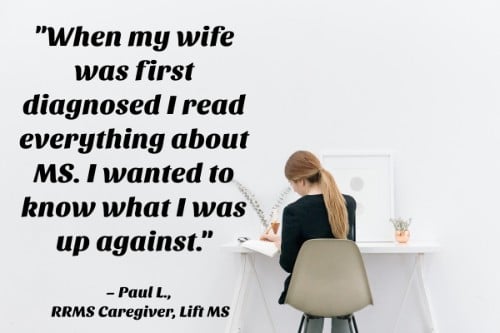
- Take the time to educate yourself on your loved one’s ailment. “When my wife was first diagnosed I read everything about MS. I wanted to know what I was up against. Caregiving became easier for me years later when I realized that I needed to know her RMS, because there is no standard. Once I understood my wife’s RMS, I have been able to be a stronger caregiver to her, watching for symptoms and helping where I am most needed.” – Paul L., RRMS Caregiver, 5 Things I Wish I Knew as a Caregiver When My Wife Was First Diagnosed, Lift MS
- Ask your caregiver’s medical team about books you can read or resources you can obtain to better learn about the condition. “Part of the caregiver job includes researching medical conditions. Be prepared for things to come by educating yourself about a parent’s illnesses or conditions. Diseases typically progress as your parent ages, symptoms increase, and new ones develop. Your parent’s physician should be able to recommend books or other resources with information about your parent’s current conditions and any possible progression. By knowing what to expect, you can make a better decision regarding your parent’s care and your level of involvement. Details about their conditions allow you to advocate for the best treatments for them.” – 10 Things to Consider Before Becoming Your Parent’s Caregiver, ARAG; Twitter: @ARAGLegal
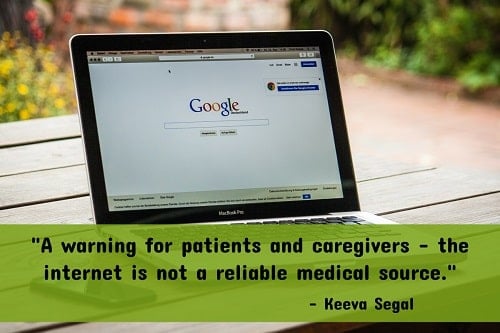
- Avoid spending too much time on WebMD or similar sites that can lead to self-diagnoses. “A warning for patients and caregivers – the internet is not a reliable medical source. Sure, there is some very good information, like on the web site for the Pancreatic Cancer Action Network. They verify – with actual doctors – what they publish. But the popular medical info web sites, blogs and such are not as reliable. I strongly recommend not using the internet for medical research. You have actual doctors and nurses at your disposal. Ask them.” – Keeva Segal, The Zen of Caregiving: How I Lost and Found Myself, Pancreatic Cancer Action Network; Twitter: @PanCAN
Advice on Dealing with Medical Needs & Professionals
- Understand what it means to be an advocate. “The older gray-haired ladies I’d seen caregiving always seemed so calm and serene and happy taking care of their husbands. I thought I would have time to learn the guitar. Was all of that ever wrong! The advocacy work that was required of me in the medical and insurance fields was phenomenal. I went from knowing zilch about any of this to becoming a semi-expert in a short time period, but it was time consuming. We were told by the doctor that my husband would recover in two weeks. Three months into it, I was tearing my hair out.
“Then I sought help from a local caregiving agency. You cannot do this alone and I learned to ask for help, and to create a community of helpers, friends and those to support us through this. My husband and I learned to advocate for those with traumatic brain injury. I learned to advocate for those in family caregiving.” – Jane Parks-McKay, I Never Would Have Asked for This Life, But I am a Better Person For It, Vitas; Twitter: @VITAS

- Master medication administration schedules, especially as they change. “Make it a point to read the handling instructions carefully. Sometimes, the medication may need to be administered in a specific manner or stored at a particular temperature. For example, you may have to inject a proper dosage of insulin using a syringe. In case of doubt, call the pharmacist or the doctor, immediately. Store all medications in a designated and secure location, especially if you are looking after someone with cognitive or memory issues. Usually, medicines need to be stored in a cool and dry area.” – Evan Thompson, CEO and founder of Senior.One, Senior Care: 10 Important Things Personal Caregivers Should Observe in Elder Care, Thrive Global; Twitter: @thrive
- When in doubt, push for second opinions. “Don’t accept the first diagnosis and treatment plan if they don’t feel right to you. You have some time, and it’s a good idea to think it through. It’s really important to go to a facility with a caring atmosphere and staff.” — Ken Owenson, as told to Erika Johnson with Myeloma Crowd, Caring for a Loved One—What You Should Know, Myeloma Crowd; Twitter: @myeolmacrowd

- Get to know your financial rights as a caregiver. “When your parent visits a new doctor, goes to the emergency room, is admitted into a hospital, assisted living facility, nursing home or visits any other type of medical facility, one thing is certain: forms have to be filled out. One of those will ask for the name and signature of the person who will be responsible for paying the bills if your parent or your parent’s insurance doesn’t.
“If you go with your loved one on those visits, you may feel pressured to get the forms filled out and signed as quickly as possible. And, like most of us, you don’t have time to read every piece of paper that’s shoved in front of you. But, if you sign the forms because your parent can’t — for whatever reason — you may make one of the biggest mistakes of your life. Even if you are your parent’s financial power of attorney (POA), when you pay their bills, sign checks, sign admittance forms for nursing homes, etc., you must be very, very careful. If done correctly, you will not become responsible for paying your loved one’s bills.
“But, many POA’s don’t know how to use their POA. Instead, they simply sign their own names. But, if you do only that, you WILL become personally responsible for paying his/her bills. And yes, that means your parent’s nursing home — for example — can come after your bank accounts and your house to pay your loved one’s bills.” – Mike Gamble, Things I Wish I Knew Before Becoming a Caregiver, Our Aging Parents
- Educate yourself on the many different hospice options and categories. “My husband and I did not know what was normal in the dying process. Should we run and get a nurse when foam appeared in my mother’s mouth? (Yes. The staff suctioned it out.) Was it normal to have her spike a fever of 106⁰? (Yes. The staff gave her Tylenol suppositories, and I kept a cool washcloth on her forehead). Was it normal for Mom to start having seizures? (Maybe not. The nurses gave her a medication to lessen the seizures.) When Mom grimaced, was it time for more morphine? (Probably. Depending on the nurse on call, the nurse either appeared at regular intervals to administer more morphine, or I had to chase them down.)
“All of this felt traumatic, and I grieve to this day for the unnecessary pain that Mom endured.” — Martha Stettinius, Hospice: When it Relieves Caregiver Anxiety, and When it Falls Short, Caregivers.com

- Don’t be afraid to discuss death with your loved one or their medical team. “The big ‘Ds,’ death and dying, can seem awkward to talk about. Tiptoeing around death can actually add stress. If you don’t know where to start, just follow your loved one’s lead.” – 7 Care Tips for When Someone You Love is Dying, Caregiver Stress; Twitter: @HomeInstead
- Get in the habit of asking specific questions. “A general question will be met with a general answer. ‘How is mom doing?’ might be answered with ‘Overall your mom is doing well for her age.’ This really isn’t that helpful. Instead ask about specifics – ‘I’ve noticed that Mom has been more constipated lately, could this be because of the new medicine she started?’” —Sarah Milanowski, Caregiver Tip: Communicating with Doctors, LifeCircles

- Always ask for discounts and generics whenever possible. “It’s no secret that prescription drugs can be expensive, but there are often alternatives that will save you money. Ask the doctor if there are generics available for your parent’s prescriptions and work with the doctor on finding an appropriate, less expensive medication if one is available.” – Talking with Doctors, AARP; Twitter: @AARP
Misconceptions About Caregivers
- Caregivers do not want to be bombarded with admiration. “Please stop telling us we are strong. I am not strong, I am dead dog tired of the physical, mental and spiritual toll. Stop telling me how strong our family is and pick up some of the load. And for crying out loud, visit these people if they cannot get out, make a phone call, send a card, drop off some potted flowers or a meal. These things help so much. Yes, my house is a mess working full-time, with a teen who needs us too! Above all do not forget us.” – Kelly, What Do You Wish Other People Understood About Caregiving?, Caregiver Space; Twitter: @theCGSpace

- Caregivers may be letting their other relationships slip away. “It’s really hard to be a good friend when you’re caring for an aging parent. Your friend may forget your birthday, cancel plans at the last minute, or go silent for months. She may forget to ask you how you’re doing, or complain nonstop about her situation. This isn’t much fun but it has nothing to do with how she feels about you.” – Anne Tumlinson, What Caregivers Really Want Their Friends to Know, Daughterhood; Twitter: @daughterhood
- Caregivers do not want to hear that caring for a loved one with memory issues is like raising a child. “Lots of folks mistakenly believe being a caretaker to an elderly person is like a having another child. Nothing could be further from the truth. An adult person has already formed opinions and routines. They can have adult conversations and as such want to be engaged. Neglecting them as if they don’t know what’s going on or have thoughts or feelings they want to express would be insulting and frustrating for them.” – Maureen Campaiola, 8 Things No One Told Me About Being a Caregiver, Maureen Campaiola; Twitter: @debtfreeforme

- Caregivers need help – and the little things matter. “Little things on a regular basis can mean a lot. Maybe someone would bring an occasional meal or dessert. Having someone help with household chores can be an opportunity to socialize as well as get things done. Maybe someone can just come and sit with your loved one so you can run to the grocery store.” — Caregiving 101: On Being a Caregiver, Family Caregiver Alliance; Twitter: @CaregiverAlly
- Caregivers need extra emotional support to get through time away from their caregiving role. “For some, taking a break after long hours caring for another can be anxiety inducing. It means straying away from a set plan which may be jammed packed with chores. Many caregivers feel guilty about taking time to relax when there are so many other things that need to be done. People can’t run on emergency mode all the time — and a lot of young caregivers learn this the hard way.” – Krystel Edwards, 5 Things You Wish Your Friends Knew About Being a Millennial Caregiver, Gen Twenty; Twitter: @gen_twenty
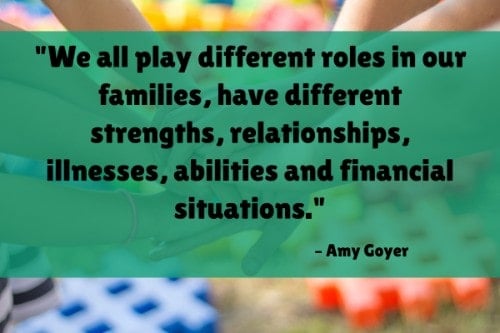
- Caregivers don’t want to hear about how friends would handle the situation. “’Caregiving would be handled differently in my family’…Really? How do you know that? Is your situation exactly the same as mine? That’s simply not possible. We all play different roles in our families, have different strengths, relationships, illnesses, abilities and financial situations. Unless or until you are in the same situation as my family you cannot really know how you would handle it. This is especially frustrating when it comes from people who have never even met our loved ones.
“Instead: Be aware that every family and situation is unique. Try saying, ‘I’m sure managing family caregiving is difficult and would be a challenge in any family.’” — Amy Goyer, Taboo to Caregivers, AARP; Twitter: @AARP
Advice for Memory Care Caregivers
- Never attempt to argue with a dementia patient. “Alzheimer’s and dementia causes your older adult’s brain to malfunction. When they say things that don’t make sense or are clearly untrue, they believe what they’re saying because it’s what their brain is telling them. It’s frustrating to hear things that aren’t true and instinctive to try to correct or remind. But that will only lead to both of you arguing or getting upset. And you simply can’t win an argument with someone who can no longer use reason or logic consistently.” – 12 Dementia Care Tips Caregivers Wish They’d Known Sooner, Daily Caring; Twitter: @DailyCaring

- Dementia can be harder for their caregiver than the loved one. “A few years ago, I had assumed that any bed-ridden person would feel helpless and miserable all the time. That is not true for her. She seems happier now than I have seen her before (even when she was young). Especially after all the frustration and agitation she showed because of the inabilities caused by dementia, this is so much pleasanter to see. She seems to be at peace with herself, and is affectionate towards all of us. She holds my hand and takes it to her lips and kisses it. If someone had told me five years ago that I’d be spending a hour or two every day just holding her hand and sitting near her, I’d not have believed it. Hey, it sounds soppy. That I can experience her affection again seems nothing short of a miracle.” – Swapna Kishore, A Year Later: One Year of Care for a Bedridden Mother; Swapna Writes; Twitter: @swapnawrites
- Keep loved ones exposed to their lifelong skills and hobbies. “My mother was a gifted piano player. She was self-taught and could play any piece of music you put in front of her. This gift is what helped her through many long weeks, months and the final year of her disease. She could play for hours on end, and even when she had forgotten the faces and names of all her friends, long after the passing of time had become meaningless to her, she could still read the music and play.” – Jasja De Smedt Kotterman, What I Wish I Knew Before My Mother’s Alzheimer’s Death, Being Patient: Twitter: @Being_Patient_

- Make use of validation therapy and therapeutic fibs. “Dementia care experts recommend joining your older adult in their reality rather than trying to force them back into ours. Trying to get them to understand facts or our reality usually causes confusion, anxiety, fear, and anger.
“Someone with dementia may insist that they’re children waiting for their mother to pick them up, they need to get to the office even though they’re retired, or they’re going to visit a relative who passed away long ago. Instead of telling them that they’re wrong, use validation therapy or therapeutic fibs to kindly respond to their version of reality. Gently ask an open-ended question about the person they’re going to see or activity they want to do. Or join their reality by saying OK, going along with the scenario for a while, then redirecting to a different activity.
“Validating their reality and allowing them to express their thoughts helps them feel calmer and happier.” – 12 Dementia Care Tips Caregivers Wish They’d Known Sooner, Daily Caring; Twitter: @DailyCaring
- Confront the ways in which toxic gender roles can affect memory care caregiving. “Stop fooling yourself about being a man. I went through a period thinking men wouldn’t ask for directions, also as a man, I would never accept defeat of the disease and taking care of my wife no matter what. I came to the conclusion that real men have courage to understand this disease is something you can’t take on alone. This disease will take away the health and life of a caregiver if that caregiver isn’t careful. My own manhood is not more important than the love of my life, it is not as important under any circumstances as my wife being properly taken care of.” – Martin Schreiber, as told to Alessandra Malito with Market Watch, This is the One Thing You Must Do If You’re Caring for Someone with Alzheimer’s, Market Watch; Twitter: @marketwatch

- Learn to sensitize yourself to your loved one’s new symptoms or changing behaviors. “I wish I had paid more attention. Once your parent is over the age of 65, a twenty-minute phone conversation once a month is not sufficient. You need to call and visit more frequently. Ask them questions so you can test their cognitive skills. Listen to them. If they keep repeating themselves excessively and cannot handle simple tasks, that is a huge red flag.
“Your parent will attempt to hide their symptoms from you. Unless you are vigilant, they will succeed. I went to my mother’s house daily and sometimes she would put the keys in the refrigerator, or she would cook odd things that didn’t go together. She would show up two hours late for hair appointments because she had been lost. These were all signals that I missed.” — Yolanda Davidson Carter, The Longest Goodbye: 5 Things I Wish I Had Known Before My Mother Got Dementia, Ms. X Factor; Twitter: @_MsXFactor
- Caring for loved ones with memory loss can take decades. “Playing a caregiving role lasts 4.6 years, on average, according to a report from the National Alliance for Caregiving (NAC). But about 15% of people spend 10 or more years helping out. Mauger, who spent a total of 30 years looking after her parents, was among them. First it was her mother with Alzheimer’s who needed help. Then, after her death, Mauger spent 10 more years caring for her father.” – Cynthia Ramnarace, 10 Things Every Caregiver Should Know, Prevention; Twitter: @PreventionMag

- Never make a promise you can’t keep. “Caregivers often make promises. ‘Mom, I promise to never place you in a nursing home.’ With heartfelt earnestness, they want to provide the best care. Fairy tales aside, there are limits to one’s seemingly boundless love. The human body can only handle so much before it sends warning signals to change one’s course of action. Never say never.” – Brenda Avadian, Top Mistakes New Caregivers Make, U.S. News; Twitter: @usnews
- Talk to your doctor about your loved one’s sundowner’s syndrome. “A doctor can help pinpoint whether there’s an underlying condition that could be causing or aggravating symptoms. Urinary tract infections are known to worsen sundowning. Doctors may be able to recommend non-drug solutions to help the patient sleep better.” — What is Sundowner’s Syndrome?, Caregiver Homes; Twitter: @seniorlinkinc
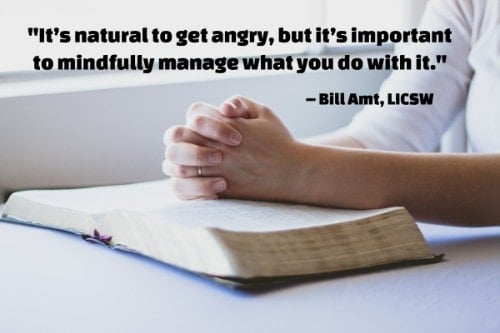
- Learn to take—and regulate—your own emotional temperature when caring for a loved one with dementia. “It’s natural to get angry, but it’s important to mindfully manage what you do with it. One reason is that people who have dementia are sensitive to your moods. If they feel afraid of you, for instance, that could have a negative impact on the caregiving and care-receiving relationship that is ideally rooted in trust.” – Bill Amt, LICSW, licensed clinical social worker and Mental Health Program Manager at Iona Senior Services, How to Manage Your Anger When Caring for Someone with Dementia, Iona
- Study the ‘dos’ and ‘don’ts’ for communicating with someone affected by dementia. “Being thrust into the role of caregiver doesn’t come with an instruction manual, but there are books, workshops, and online training resources that can teach you the skills you need. Learn all you can about symptoms, treatment, and behavior management. As the disease progresses and challenges change, you’ll need to update your skillset and find new ways of coping.” – Tips for Alzheimer’s and Dementia Caregivers, HelpGuide; Twitter: @helpguideorg
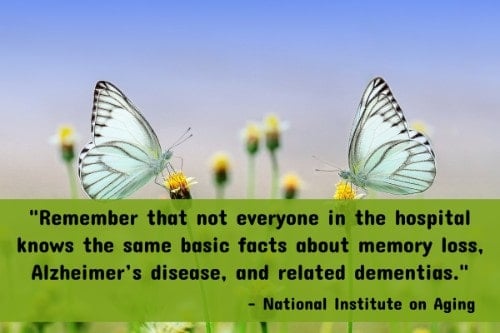
- Plan for future hospital stays. “Remember that not everyone in the hospital knows the same basic facts about memory loss, Alzheimer’s disease, and related dementias. You may need to help teach hospital staff what approach works best with the person with Alzheimer’s, what distresses or upsets him or her, and ways to reduce this distress.
“You can help the staff by providing them with a personal information sheet that includes the person’s normal routine, how he or she prefers to be addressed (e.g., Miss Minnie, Dr. James, Jane, Mr. Miller, etc.), personal habits, likes and dislikes, possible behaviors (what might trigger them and how best to respond), and nonverbal signs of pain or discomfort. Help staff understand what the person’s ‘baseline’ is (prior level of functioning) to help differentiate between dementia and acute confusion or delirium.” — Going to the Hospital: Tips for Dementia Caregivers, National Institute on Aging; Twitter: @Alzheimers_NIH
- Constipation and incontinence can further compromise the health of dementia patients. “Many things can cause constipation. These include a diet high in refined or processed foods and low in fibre. It can also be caused by a lack of physical activity as well as some prescription drugs and over-the-counter medications. Bowel movements can often be regulated by eating well, increasing dietary fibre intake, drinking at least eight glasses of water every day and exercising regularly. If constipation remains a problem, consult a health-care professional. A limited course of laxatives may be prescribed, but over-use can sometimes worsen the situation.” – Caregiver’s Guide: Practical Information for Caregivers of Older Adults, New Nouveau Brunswick; Twitter: @gov_nb

